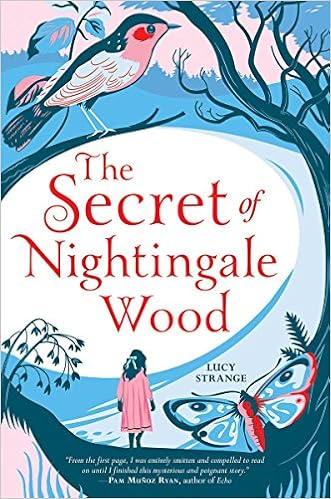
For young readers, a fairy tale filled with real-life concerns
When Henry walks into rundown, slightly spooky Hope House, her father calls it a “fresh start” for the family. But the troubles they carry with them aren’t so easy to set down for Henrietta Georgina Abbott and her little sister, Piglet, who are trapped in a world where the adults’ motives are as murky and confusing as the woods surrounding the house.
Lucy Strange’s “The Secret of Nightingale Wood,” set in England just after World War I, is filled with fairy-tale references, from the elaborate book of stories Henry treasures to a mysterious witch living in the woods (Chicken House, ages 10 and up, $16.99). But Henry’s problems are very real – a heartbreaking family secret, an absent father, a mother crushed by grief, and doctors at a nearby asylum whose treatments for the suffering woman are the stuff of nightmares.
Henry is hurting, too, but plucky and determined enough to battle her way through a world of grieving people, with some help from her friend Moth, who helps her draw on reserves she didn’t know she had, to “look for the part of the moon that is hidden in shadow. … Trust that it is there even when it can’t be seen.”
The hidden strength Henry uncovers leads to an ending that’s not full of fairy-tale magic but of the everyday kind – courage, kindness, forgiveness, and a little bit of mischief. Somehow, first-time author Strange finds an ending more complex than “happily ever after,” and far more satisfying, because there is plenty of hope to lighten the sadness.
Lucy Strange’s “The Secret of Nightingale Wood,” set in England just after World War I, is filled with fairy-tale references, from the elaborate book of stories Henry treasures to a mysterious witch living in the woods (Chicken House, ages 10 and up, $16.99). But Henry’s problems are very real – a heartbreaking family secret, an absent father, a mother crushed by grief, and doctors at a nearby asylum whose treatments for the suffering woman are the stuff of nightmares.
Henry is hurting, too, but plucky and determined enough to battle her way through a world of grieving people, with some help from her friend Moth, who helps her draw on reserves she didn’t know she had, to “look for the part of the moon that is hidden in shadow. … Trust that it is there even when it can’t be seen.”
The hidden strength Henry uncovers leads to an ending that’s not full of fairy-tale magic but of the everyday kind – courage, kindness, forgiveness, and a little bit of mischief. Somehow, first-time author Strange finds an ending more complex than “happily ever after,” and far more satisfying, because there is plenty of hope to lighten the sadness.
No comments:
Post a Comment